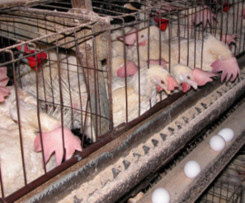
HELP TO IMPROVE THE LIVES OF EGG-PRODUCING CHICKENS
It’s been a long and often bitter struggle between the animal welfare community and the animal-food-producing industry.
So, it was truly amazing when, last July, the Humane Society of the United States and the United Egg Producers (a voluntary federation of egg-producers in the United States) entered into a landmark agreement to begin to improve the lives of egg-producing chickens.
Chickens are the least protected farm animals. They are not covered by any Animal Welfare Acts and are exempt from individual state laws prohibiting cruelty to animals as well as exempt from the federal Humane Methods of Slaughter Act.
Chickens are “open game” for the egg producing industry . More than 90-percent of egg-laying hens in the United States are housed for life in battery cages. These wire cages allow only approximately 67 square inches of space for the several hens housed in each cage.
These horror chambers fail to provide adequate space for the instinctive and natural behaviors of hens including roosting, dust bathing and, in particular, nesting. Hens instinctively search for private space to lay eggs. These space-starved chickens often crawl under other hens in a valiant search for privacy.
Last week, Senate Bill 3239, federal legislation to reform the egg industry and ban barren battery cages nationwide, was introduced in the U.S. Senate by Sen. Dianne Feinstein, D-Calif., with a bipartisan group of original cosponsors, including Connecticut Senator, Richard Blumenthal, D-Conn.
This bill (identical to H.R. 3798 introduced earlier in the House) “will lead to major improvements in the treatment of 280 million hens involved in U.S. egg production, essentially doubling the amount of space per bird, banning inhumane practices such as forced starvation molting, and requiring on-carton labeling so consumers know how hens are raised.
According to Human Society of the United States, “Now is a critical moment in the fight to ban barren battery cages, and we urgently need your help to help push the Senate bill forward. Please make a brief, polite phone call to your other U.S. Senator Joseph Lieberman at (202) 224-4041 and ask him to support and co-sponsor S. 3239. And don't forget to send a follow-up message. Then, if you have a minute more, please make a call to Senator Blumenthal at (202) 224-2823 and thank him for his co-sponsorship of S.
The bill if passed will require battery cages be replaced through an ample phase-in period, with new, enriched housing systems that will provide each hen nearly double the amount of space they’re currently allotted. Egg producers will invest an additional $4 billion over the next 15 years to effect this industry-wide make-over;
It will require all egg-laying hens be provided, through the new enriched housing system, with environments that will allow hens to express natural behaviors, with the use of perches, nesting boxes, and scratching areas;
It will mandate labeling on all egg cartons nationwide to inform consumers of the method used to produce the eggs, such as “eggs from caged hens,” “eggs from hens in enriched cages,” “eggs from cage-free hens,” and “eggs from free-range hens”;
The agreement will also give consumers a clearer understanding of the confusing labeling now found on commercially packaged eggs. Currently, there are so many different labels on packaged egg cartons it’s almost impossible to determine what they mean.
Here’s a short list of confusing commercial egg carton labels- all uncovered in local supermarkets:
Certified Humane: The Humane Farm Animal Care (HFAC) is a non-profit organization that certifies the humane treatment of animals raised by meat, poultry, egg or dairy producers. There are only a few egg producers (about 1-percent) who are certified to carry their label.
“No Cages:” The label indicates that must hens have at least 1.5 square feet of floor space with outside access. Doors to the outside "must allow more than one hen at a time to exit."
Cage free: This doesn’t necessarily mean that the quality of life for hens is perfect. They can be packed into massive sheds with only a tiny opening to the outdoors. There are no regulations about space requirements inside or out.
Organic certified: Usually means that the hens have access to the outdoors, are fed organic feed with no antibiotics.
Free-range: This usually means the chickens are allowed to roam outdoors. However, detractors point out that in many instances the doors to the hen sheds are kept closed until the chicks reach an age where they would not choose to go out on their own.
Organic eggs: There are federal regulations governing organic labels. The chickens must be fed organic feed (grown without commercial fertilizers or pesticides), and are not given hormones or antibiotics. However, this label has nothing to do with how the animals are kept.
Confused? So am I.
Fortunately, we live in area where we have an alternative. Until such time as we can be assured that the eggs we buy are produced from humanely treated hens, buy a flock of chickens or, easier still, stop on the side of the road in any of several spots in town and buy eggs direct from the local farms.
Not only are they fresh, but you’ll be supporting the local farmers, who treat their chickens well, like Newtown resident Susan Kokoska, owner of a small chicken flock says, they are “living, breathing beings
Although the new agreement may not provide chickens with the ultimate in much-needed expanded space, it “could set a precedent for the cattle/pig/lamb/calf, etc. farmers to follow suit and improve the quality of life of their livestock," according to Kokoska. "It also helps to elevate the status of food animals and that's good for the general public to see in that they may start to see animals in general in a different light. All my chickens are pets. Around here, if I have my own way, they will all die of old age.”

